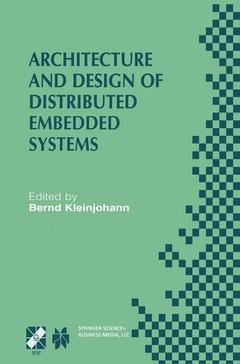Description
Architecture and Design of Distributed Embedded Systems, Softcover reprint of the original 1st ed. 2001
IFIP WG10.3/WG10.4/WG10.5 International Workshop on Distributed and Parallel Embedded Systems (DIPES 2000) October 18–19, 2000, Schloß Eringerfeld, Germany
IFIP Advances in Information and Communication Technology Series, Vol. 61
Coordinator: Kleinjohann Bernd
Language: English
Subjects for Architecture and Design of Distributed Embedded Systems:
Architecture and Design of Distributed Embedded Systems
Publication date: 03-2013
238 p. · 15.5x23.5 cm · Paperback
Publication date: 03-2013
238 p. · 15.5x23.5 cm · Paperback
Architecture and design of distributed embedded systems (international federation for information processing 189)
Publication date: 04-2001
238 p. · 15.5x23.5 cm · Hardback
Publication date: 04-2001
238 p. · 15.5x23.5 cm · Hardback
Description
/li>Contents
/li>
Due to the decreasing production costs of IT systems, applications that had to be realised as expensive PCBs formerly, can now be realised as a system-on-chip. Furthermore, low cost broadband communication media for wide area communication as well as for the realisation of local distributed systems are available. Typically the market requires IT systems that realise a set of specific features for the end user in a given environment, so called embedded systems. Some examples for such embedded systems are control systems in cars, airplanes, houses or plants, information and communication devices like digital TV, mobile phones or autonomous systems like service- or edutainment robots.
For the design of embedded systems the designer has to tackle three major aspects:
This book documents the high quality approaches and results that were presented at the International Workshop on Distributed and Parallel Embedded Systems (DIPES 2000), which was sponsored by the International Federation for Information Processing (IFIP), and organised by IFIP working groups WG10.3, WG10.4 and WG10.5. The workshop took place on October 18-19, 2000, in Schloß Eringerfeld near Paderborn, Germany.
Architecture and Design of Distributed Embedded Systems is organised similar to the workshop. Chapters 1 and 4 (Methodology I and II) deal with different modelling and specification paradigms and the corresponding design methodologies. Generic system architectures for different classes of embedded systems are presented in Chapter 2. In Chapter 3 several design environments for the support ofspecific design methodologies are presented. Problems concerning test and validation are discussed in Chapter 5. The last two chapters include distribution and communication aspects (Chapter 6) and synthesis techniques for embedded systems (Chapter 7).
This book is essential reading for computer science researchers and application developers.
For the design of embedded systems the designer has to tackle three major aspects:
- The application itself including the man-machine interface,
- The (target) architecture of the system including all functional and non-functional constraints and,
- the design methodology including modelling, specification, synthesis, test and validation.
This book documents the high quality approaches and results that were presented at the International Workshop on Distributed and Parallel Embedded Systems (DIPES 2000), which was sponsored by the International Federation for Information Processing (IFIP), and organised by IFIP working groups WG10.3, WG10.4 and WG10.5. The workshop took place on October 18-19, 2000, in Schloß Eringerfeld near Paderborn, Germany.
Architecture and Design of Distributed Embedded Systems is organised similar to the workshop. Chapters 1 and 4 (Methodology I and II) deal with different modelling and specification paradigms and the corresponding design methodologies. Generic system architectures for different classes of embedded systems are presented in Chapter 2. In Chapter 3 several design environments for the support ofspecific design methodologies are presented. Problems concerning test and validation are discussed in Chapter 5. The last two chapters include distribution and communication aspects (Chapter 6) and synthesis techniques for embedded systems (Chapter 7).
This book is essential reading for computer science researchers and application developers.
Content.- A Methodology for Complex Embedded Systems Design: Petri Nets within a UML Approach.- Efficient System Modeling for Complex Real-Time Industrial Networks using the ACCORD/UML Methodology.- Analog/Digital Co-Design.- A Design Methodology for Embedded Systems based on Multiple Processors.- An Architecture for Reliable Distributed Computer-Controlled Systems.- Generic Architecture Platform for Multiprocessor System-On-Chip Design.- JPURE — A Purified Java Execution Environment for Controller Networks.- Optimizing Functional distribution in Complex System Design.- Customizing Software Toolkits for Embedded Systems-On-Chip.- Framework for System Design, Validation and Fast Prototyping of Multiprocessor System-On-Chip.- The Specification Language SpecC within the PARADISE Design Environment.- Real-Time Support for Online Controller Supervision and Optimisation.- A Product Family Approach to Graceful Degradation.- Environment Modelling in Closed Specifications of Embedded Systems.- Test Case Design for the Validation of Component-Based Embedded Systems.- Timing Constraints Validation using UPPAAL: Schedulability Analysis.- A New Dynamic Scheduling Algorithm for Real-Time Multiprocessor Systems.- Deriving Message Passing Protocols from Collective Behavior.- Java Real-Time Publish-Subscribe Middleware for Distributed Embedded Systems.- A Verified Hardware Synthesis of Esterel Programs.- EXPLORA — Generic Design Space Exploration during Embedded System Synthesis.- Automatic Code Generation for Multirate Simulink Models with Support for the OSEK Real-Time Operating System.
© 2024 LAVOISIER S.A.S.




